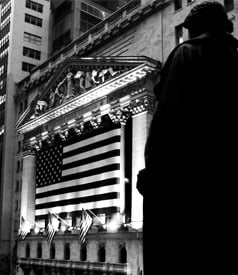 "You all are the house, you're the bookie. (Your clients) are booking their bets with you. I don't know why we need to dress it up. It's a bet." - Sen. Claire McCaskill, Senate Subcommittee investigating Goldman Sachs (Washington Post, April 27, 2010)How Brokers Became Bookies: The Insidious Transformation of Markets Into Casinos
"You all are the house, you're the bookie. (Your clients) are booking their bets with you. I don't know why we need to dress it up. It's a bet." - Sen. Claire McCaskill, Senate Subcommittee investigating Goldman Sachs (Washington Post, April 27, 2010)How Brokers Became Bookies: The Insidious Transformation of Markets Into CasinosTuesday 13 July 2010
by: Ellen Brown, t r u t h o u t | Op-Ed
Ever since December 2008, the Federal Reserve has held short-term interest rates near zero. This was not only to try to stimulate the housing and credit markets, but also to allow the federal government to increase its debt levels without increasing the interest tab picked up by the taxpayers. The total public US debt increased by nearly 50 percent from 2006 to the end of 2009 (from about $8.5 trillion to $12.3 trillion), but the interest bill on the debt actually dropped (from $406 billion to $383 billion), because of this reduction in interest rates.
One of the dire unintended consequences of that maneuver, however, was that municipal governments across the country have been saddled with very costly bad derivatives bets. They were persuaded by their Wall Street advisers to buy credit default swaps to protect their loans against interest rates shooting up. Instead, rates proceeded to drop through the floor, a wholly unforeseeable and unnatural market condition caused by rate manipulations by the Fed. Instead of the banks bearing the losses in return for premiums paid by municipal governments, the governments have had to pay massive sums to the banks - to the point of pushing at least one county to the brink of bankruptcy (Jefferson County, Alabama).
Another unintended consequence of the plunge in interest rates has been that "savers" have been forced to become "speculators" or gamblers. When interest rates on safe corporate bonds were around 8 percent, a couple could aim for saving half a million dollars in their working careers and count on reaping $40,000 yearly in investment income, a sum that, along with Social Security, could make for a comfortable retirement. But very low interest rates on bonds have forced these once-prudent savers into the riskier and less predictable stock market, and the collapse of the stock market has forced them into even more speculative ventures in the form of derivatives, a glorified form of gambling. Pension funds, which have binding pension contracts entered into when interest was at much higher levels, need an 8 percent investment return to meet their commitments. In today's market, they cannot make that sort of return without taking on higher risk, which means taking major losses when the risks materialize.
Derivatives are basically just bets. Like at a racetrack, you don't need to own the thing you're betting on in order to play. Derivative casinos have opened up on virtually anything that can go up or down or have a variable future outcome. You can bet on the price of tea in China, the success or failure of a movie, whether a country will default on its debt, or whether a particular piece of legislation will pass. The global market in derivative trades is now well over a quadrillion dollars - that's a thousand trillion - and it is eating up resources that were at one time invested in productive enterprises. Why risk lending money to a corporation or buying its stock, when you can reap a better return betting on whether the stock will rise or fall?
The shift from investing to gambling means that not only are investors making very little of their money available to companies to produce goods and services, but the parties on one side of every speculative trade now have an interest in seeing the object of the bet fail, whether a company, a movie, a politician or a country. Worse, high-speed program traders can actually manipulate the market so that the thing bet on is more likely to fail. Not only has the market become a casino, but the casino is rigged.